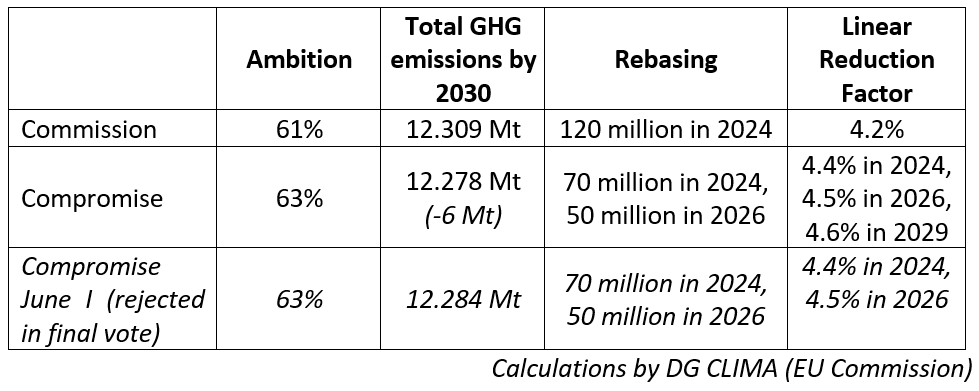Good for the climate and good for jobs / 25 times more contribution to 2030 target than CO2 car regulation / Maritime transport, commercial road transport and buildings as well as process emissions for small businesses included
"Today's plenary decision is good for the climate and good for jobs. I am very relieved and glad that a large majority is now living up to its responsibility," commented the European Parliament's rapporteur, EPP MEP Dr. Peter Liese, on his colleagues' approval of the biggest climate protection law ever in plenary. "With this decision, we are making it legally binding that we save more CO2 in the next 8 years than in the last 30 years. That means we have to achieve at least 4 times as much emissions reductions per year. The ETS is the centerpiece of the Fit for 55 package: we are creating a reduction of 1.5 billion tons of CO2 with it, or 1,500 million . The controversial decision on CO2 cars will only bring 60 million by 2030 ."
The decisive factor for the large approval was an agreement between the three largest groups (Christian Democrats, Social Democrats and the liberal Renew Group) on the timetable for the introduction of the border adjustment mechanism (CBAM) and the phase out of free certificates for the affected industries such as steel, cement and chemicals. The agreement foresees that the reduction of free allowances and the start of CBAM will not begin until 2027. This is two years later than envisaged by the Environment Committee and one year later than proposed by the Commission. The start is also supposed to be very soft and cautious with only 7% burden for products from third countries and 7% less free allocation in the EU. Then, however, things are to move very quickly, with the mechanism taking full effect in 2032. That is three years earlier than envisaged by the Commission. "For us as EPP it is important that the new border adjustment mechanism is first carefully prepared and works really well before the free allowances are cancelled. The introduction of the mechanism is a mammoth project. It must first work technically and, above all, we need acceptance in the third countries. None of this can be taken for granted. If the free certificates are hastily reduced and disappear altogether without CBAM working properly, this could lead to massive job losses. If it works then, it can also be introduced completely quickly," Liese said.
Many decisions that the European Parliament had already made two weeks ago on June 08 were confirmed in Wednesday's vote. The ambition level for the sectors covered by emissions trading, will be raised from 43% to 63%. The European Commission had proposed only 61%. The important thing is that we give industry and people breathing space in this difficult phase when we have to replace Russian gas. German Minister Robert Habeck is right that we need to burn more coal. That's why the ambition level is lower until 2026. But we will more than make up for this shortfall by 2030. Companies that are particularly innovative and are highly determined to achieve climate neutrality as soon as possible, will receive additional incentives. However, those companies that do not make investments and do not have credible decarbonization plans, must expect to have 100% of their free certificates cancelled. The compromise also includes an amendment which is particularly important for the steel industry. The system for establishing the benchmarks will not be tightened compared with the previous system.
For the first time, maritime transport will be included in emissions trading. "For many years, the European Parliament has been fighting for strict environmental rules in the field of maritime transport. Ships often burn very harmful fuels and have hardly been subject to European environmental and climate protection legislation. This is now changing. It is important that the revenues from emissions trading do not disappear in the general budget, but are made available to the industry for investments in clean ships and corresponding infrastructure in the ports," said Liese.
The compromise on the inclusion of road transport and heat in emissions trading (ETS II) was also confirmed. Contrary to the proposal of the European Commission and the original considerations of the rapporteur Liese, initially only commercial transport and commercial buildings will be included. Only in 2029 and also only after a renewed co-decision procedure, private road transport and private heating will be included. "This compromise, which I already had to make in committee, is very painful for me, but the corresponding agreement is better than the complete deletion of the new ETS for heating and road transport as it was requested initially by the Social Democrats, the Greens and the Right. Here, I am very curious about the position of the Council. In many places, I strongly believe that the compromise is better than the Council's emerging position and the Commission's original proposal. We propose to include process emissions from industry, for example, emissions from foundries and plastics processing plants. This will cover more emissions and ensure a level playing field in the European Union. We are also proposing a price cap and it is urgent that we keep a closer eye on the oil companies. The developments in recent weeks have shown that reduced costs are not necessarily passed on to consumers, but increased costs are used to make huge profits on the backs of citizens. We are calling for oil and gas companies to take over their share of the costs from ETS II. Very importantly, Parliament wants to bring forward the Social Climate Fund from 2025 to 2024. We absolutely need to help low-income families to cope with the challenges," Liese said.
On the development of the last 14 days, Liese said, "I think the whole fuss on 08 June, when the report was rejected, was unnecessary. Social Democrats and Greens claim that we are now closer to the 1.5 degree target than we were two weeks ago. In fact, the ambition level has been increased, but only by 6 million tons. That's 0.01% of global greenhouse gas emissions. So it is obviously not a revolutionary change in the ambition level that has now motivated the Social Democrats and Greens to vote in favour, but rather the realisation that it is irresponsible to vote with the right against the most important climate change bill ever. Be that as it may. Regardless of where the motivation lay, I am pleased with this broad approval and hope that we can implement the key points in the negotiations with the Council. If the Council adopts its position as planned next Tuesday, June 28, we will start negotiations in the trilogue immediately after the Czech Presidency begins," Liese explained.




